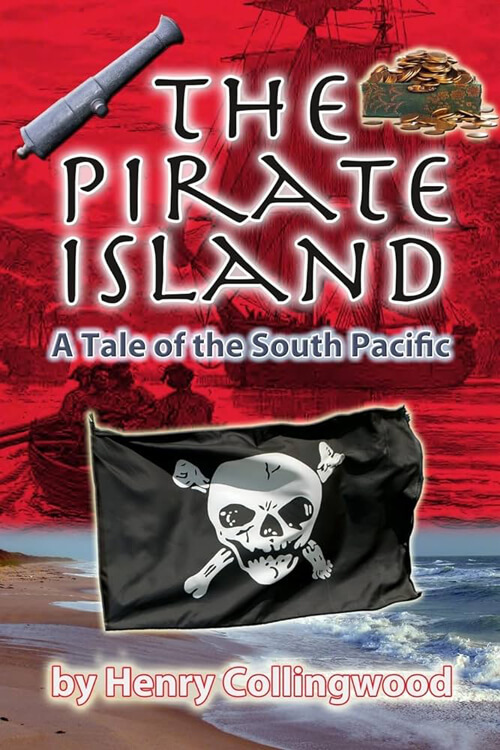
The Pirate Island, A Story of the South Pacific
It was emphatically “a dirty night.” The barometer had been slowly but persistently falling during the two previous days; the dawn had been red and threatening, with a strong breeze from S.E.; and as the short dreary November day waxed and waned this strong breeze had steadily increased in strength until by nightfall it had become a regular “November gale,” with frequent squalls of arrowy rain and sleet, which, impelled by the furious gusts, smote and stung like hail, and cleared the streets almost as effectually as a volley of musketry would have done.
It was not fit for a dog to be out of doors. So said Ned Anger as he entered the snug bar parlor of the “Anchor” at Brightlingsea, and drawing a chair close up to the blazing fire of wreck-wood which roared up the ample chimney, flung himself heavily down thereon to await the arrival of the “pint” which he had ordered as he passed the bar.
“And yet there are many poor souls as has to be out in it, and as is out in it,” returned the buxom hostess, entering at the moment with the aforesaid pint upon a small tray. “It’s to be hoped as none of ’em won’t meet their deaths out there among the sands this fearful night,” she added, as Ned took the glass from her, and deposited his “tuppence” in the tray in payment therefor.
A sympathetic murmur of concurrence went around the room in response to this philanthropic wish, accompanied in some instances by doubtful shakes of the head.
“Ay, ay, we all hope that,” remarked Dick Bird—“Dicky Bird” was the name which had been playfully bestowed upon him by his chums, and by which he was generally known—“we all hope that; but I, for one, feels uncommon dubious about it. There’s hardly a capful of wind as blows but what some poor unfort’nate craft leaves her bones out there,”—with a jerk of the thumb over his shoulder to seaward,—“and mostly with every wreck there’s some lives lost. I say, mates, I suppose there’s somebody on the lookout?”
“Ay, ay,” responded old Bill Maskell from his favorite corner under the tall old-fashioned clock case, “Bob’s gone across the creek and up to the tower, as usual. The boy will go; always says as how he must go up there and keep a look-out in bad weather; so, as his eyes are as sharp as needles, and since one is as good as a hundred for that sort of work, I thought I’d just look in here for an hour or two, so’s to be on the spot if in case any of us should be wanted.”
“I’ve often wondered how it is that it always falls to Bob’s lot to go up on the lookout in bad weather. How is it?”
Read or download Book
Harry Collingwood
Harry Collingwood was the pseudonym of William Joseph Cosens Lancaster (23 May 1843 – 10 June 1922), a British civil engineer and novelist who wrote over 40 boys’ adventure books, almost all of them in a nautical setting.
Biography.
In September 1860, at age 17, he began working as a pupil in the architectural office of G R Crickmay RIBA in Dorset. That architectural practice continues today under the name of John Stark and Crickmay. He continued in Dorset until March 1864 and then moved to Durban in South Africa. He worked there in a range of posts until the end of 1870, by which time he was the Government Engineer and Surveyor for the Port District of Natal. He returned to the UK in 1871 and worked on an eight-mile section of the Devon to London Railway for two years (the section of the London and South Western Railway from Okehampton to Lydford was under construction at this time). He continued in the UK, working on a range of projects including harbor works in the Isle of Man, as well as work at Burntisland on the Firth of Forth, where he lived in 1880 while advertising in Coleraine in Northern Ireland, for accommodation for himself, his wife, and infant son. In 1888 he spent a year on the island of Trinidad, surveying for a deep-water port and associated railway. He also traveled to the Baltic, Mediterranean, and the East Indies. His wide travels provided accurate backgrounds for many of his works. Returned to England, and now living in Norwood, London, Collingwood applied for associate membership of the Institution of Civil Engineers on 31 July 1889 and was elected on 3 December 1889.
Associated membership is the grade of membership open to engineers who are not academically qualified Civil Engineers, but have learned engineering by another route. In 1893 Collingwood was one of the three short-listed candidates from the 89 applicants for Resident Engineer at Llanelly Harbour, but was unsuccessful. From 1894 to 1896 he was an engineer, working out of London, for works on the River Bann for the Coleraine Harbour Commissioners. In 1906, Collingwood moved to Mutley in Plymouth. By 1908 he was back in London, at New Bushey in Watford, London.






